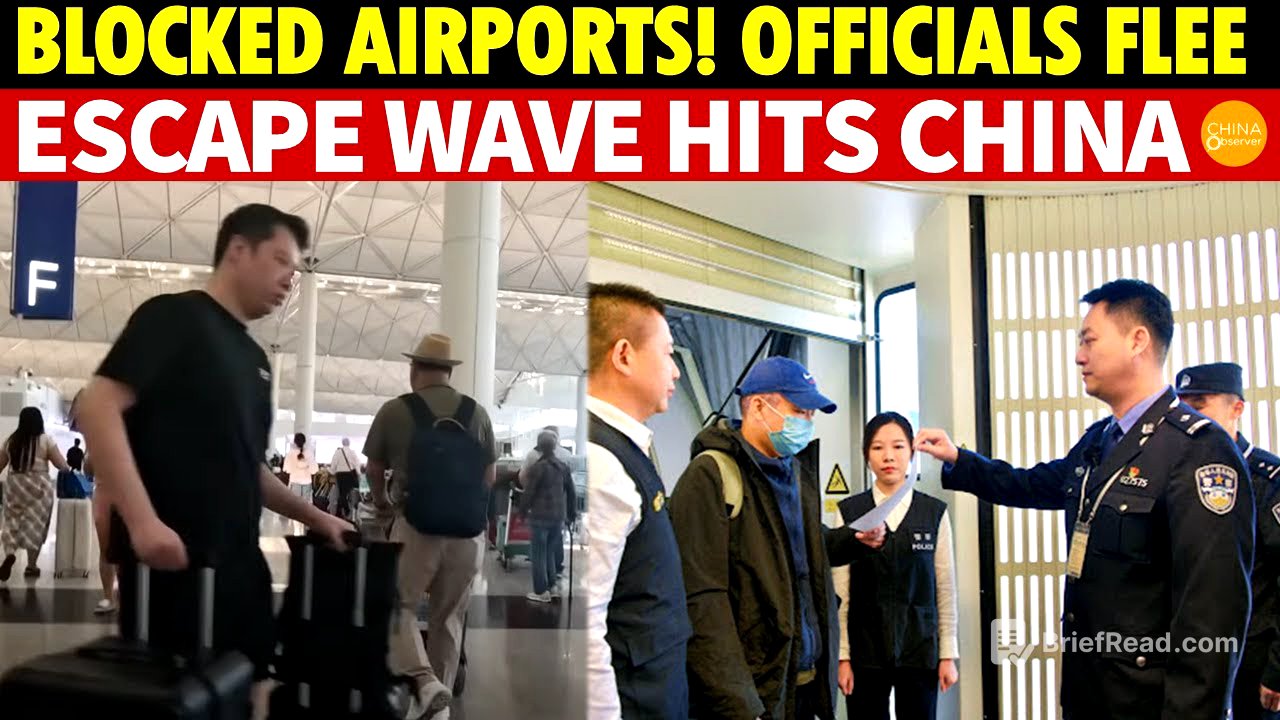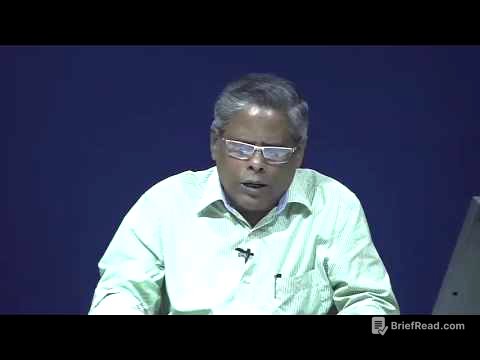TLDR;
The video discusses the increasing trend of "escape-style resignations" among Chinese state-owned enterprise (SOE) executives and government officials, driven by factors such as economic decline, anti-corruption campaigns, and political purges. It highlights the case of Jang Yaoong, a former chairman of Greentown China, who was intercepted at Hong Kong airport while attempting to flee to Canada. The video also touches on the strict monitoring and harsh interrogation methods faced by officials under investigation, exemplified by the rumoured death of former Foreign Minister Qing Gong.
- Economic instability and declining fiscal revenue are pushing officials to seek alternative income sources.
- Anti-corruption campaigns have expanded to include family members, intensifying the pressure on officials.
- The CCP's internal purges and the mysterious disappearance of high-ranking officials create an atmosphere of fear and uncertainty.
Jang Yaoong's Interception and the Crackdown on "Escape-Style Resignations" [0:00]
On June 26th, Jang Yaoong, the former chairman of Greentown China, was apprehended at Hong Kong International Airport while attempting to fly to Canada. Jang had resigned from his position in March, raising speculation about his future plans. His attempt to leave the country via Hong Kong, based on advice that it would count as leaving China, was thwarted. Jang's background includes a long career in government in Dalian before joining Greentown China, a subsidiary of China Communications Construction Group (CCCC). Greentown China has significant debt and declining profits, while CCCCC is a large state-owned enterprise. Jang's interception triggered a series of events, including the removal of Wong Cho, the former chairman of CCCCC, and emergency leadership changes within the company.
The Nature and Motivations Behind "Escape-Style Resignations" [3:55]
An article by a new media organisation analysed the central government's renewed emphasis on monitoring "escape-style resignations," which involve SOE executives resigning early to avoid accountability. These resignations fall into three categories: evasion, option, and profit-seeking. Industries like state-owned enterprises, energy, tobacco, and pharmaceuticals are particularly vulnerable to corruption due to concentrated power and abundant resources. The article highlights the case of Hongjo, a former Bank of China vice president, who was investigated years after his resignation for accepting bribes and engaging in illegal activities.
Political Factors and the Bureaucratic System [6:01]
Commentators suggest that motivations for "escape-style resignations" extend beyond corruption, including factional purges and the need to avoid responsibility for past illegal activities. Analysts view these resignations as a way for officials to hedge their bets, with the increase in such cases potentially signalling broader economic or political instability. The response to these resignations involves strengthening supervision of departing officials, including pre-resignation checks and strict monitoring after their departure.
Economic Pressures and the Illusion of Stability [8:33]
The illusion of stability for state-owned enterprise executives has been shattered by China's declining fiscal revenue and the debt burden of state-owned enterprises. Local governments are facing financial strain, leading to salary cuts and layoffs for civil servants. A new policy encourages struggling public servants to take up side jobs, reflecting the combined crises of local government finances, real estate collapse, and employment downturn. Civil servants in various regions have experienced significant salary cuts, and layoffs are occurring across the country.
Family Guilt Purges and the Perilous Political Situation [11:55]
For senior executives, the primary focus is on acquiring more wealth and transferring their assets and families to safety due to the increasingly perilous domestic political situation. The CCP's anti-corruption campaign has escalated into "family guilt purges," targeting not only officials but also their family members. Details of the CCP's anti-corruption detention process reveal harsh conditions and interrogation methods, causing mental breakdowns and even death. Officials face restrictions on leaving the country, and the continuous exposure of information about national-level officials has solidified their determination to flee.
The Disappearance of Qing Gong and Brutal Interrogation Methods [14:22]
The mysterious disappearance of former Foreign Minister Qing Gong and rumours surrounding his death have further terrified officials. Reports suggest that Qing Gong was subjected to brutal interrogation methods, including "three major tortures" and "black and white impermanence," which led to his accidental death. The officials conducting these interrogations are frequently rotated and kept unaware of the identity of the person being held. While there have been speculations about Qing Gong's fate, the CCP has not issued any clarification.
The Sinking Ship and the Failed Escape of Jang Yaoong [18:10]
Some commentators believe that the CCP is a "sinking ship," prompting officials to escape. Jang Yaoong's failed attempt to flee was attributed to his lack of understanding of the current situation in Hong Kong and his underestimation of the surveillance he was under. To successfully escape China, one would need to sever all communications, abandon electronic devices, and sneak into neighbouring countries before flying to Canada. Jang's naivety and reliance on outdated information led to his interception.








